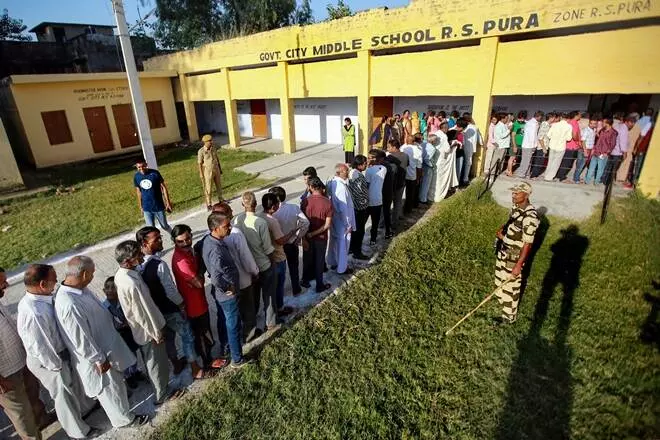
The democratic process in Jammu-Kashmir
text_fieldsJammu & Kashmir is going to face elections for the first time ever since the revocation of the special status of the state under Article 370, on August 5 last year. At the time of declaring polls to the district development councils, to be held in eight phases between 28 November and 19 December, the central government and the BJP had antipated that the mainstream political parties of Jammu-Kashmir would boycott it. The BJP had calculated that they could project the prominent political parties' boycott and distrust of the democratic process, as justification for the clampdown going on for over a year in the state. But the decision of the PADG (People's Alliance for Gupkar Declaration) to unitedly contest the election, has upset the the strategy of the Centre. The PADG was formed under the leadership of the 84-year old National Conference leader Farooq Abdullah, at his Gupkar Road residence with the participation of seven parties including the National Conference, People's Democratic Party (PDP), the Communist Party of India-Marxist (CPM) and the People's Conference of Sajjad Lone. This alliance of the mainstream parties of the Valley has apparently made the BJP nervous. Hence the central government and the sangh parivar have started trying to overcome this consternation and jitters through statements triggering hatred and anti-democratic remarks.
If the electoral exercise in the state is held in a transparent and fair manner, it is potentially a golden opportunity to win the hearts and minds of the people of the Valley, who have lost all their faith because of the unfair actions of the Centre over the last one year. If peace is what the central government seeks to establish in Kashmir, they should have welcomed the alliance and their very decision to be part of the electoral process. Now that the main parties have shown their confidence in the democratic process - even after the Centre withdrawing its special rights and making Jammu-Kashmir an open jail - the central government had a moral binding to recognise it and reciprocate that spirit. But what is in display instead is that not only the RSS leader Indresh Kumar, but even home minister Amit Shah and central ministers Nirmala Sitharaman, Ravishankar Prasad and Pralhad Joshi are found indulging in conflict creation by comments such as that the Gupkar pact promotes terrorism, it alienates Kashmir from India, brings memories of riots, and that is an anti-national unholy alliance.
The aim of the Gupkar popular alliance is to fight together for the restoration of the special status of Jammu-Kashmir and the rights of the people. Farooq Abdullah said in a rather emotional tone, "I am here to do something for the people and the day I will finish my work, I will leave this world," while addressing the party workers after a gap of a year. Even as Congress general secretary Randeep Singh Surjewala makes it clear that the party does not agree with the Gupkar front, the Congress party has also decided to make local adjustments with its constituents. For this very reason, this consolidation of major parties is expected to make the election favourable for the alliance. They hope that such a victory will be judged as a popular will against the Kashmir policy of the central government and the BJP. Right at the time the authorities started attempts to enforce the Forest Rights Act of 2006 in Ladakh and Kashmir regions, the Gujjar and Bakarwal communities had become infuriated. The front's vice president Mehbooba Mufti and convenor Mohammed Yousuf Tarigami are confident that the curfews that pervade the entire region and discriminatory governmental interventions will make their impact felt in the election.
The Centre fears that the political upper hand likely to help the Gupkar alliance will validate the contention that the abrogation of Articles 370 and 35A are unacceptable to the Kashmiris. They are also concerned that the propaganda that the liberation of Kashmiris is complete in Modi's new India, will be proven as hollow at a global level. Therefore, the BJP has decided to resist it at any cost. And on the suspicion that by citing an apprehension about high speed internet being misused to topple the upcoming election, Principal Secretary of home ministry Shaleen Kabra has issued orders extending the ban of 3G and 4G internet. in 18 out of 20 districts. Further, in the name of security regulations, 25,000 additional security personnel have been deployed and stringent restrictions imposed on election campaigns. The distinction between the Central government and political parties is going to disappear completely. In short, for a precise answer to the question whether the Jammu-Kashmir's district council elections will further estrange Kashmiris from us, or it will help restore the confidence in democratic process, one has to wait till the results on December 22.























